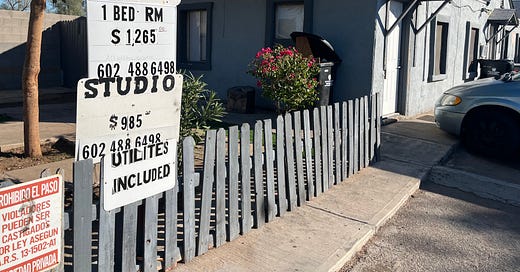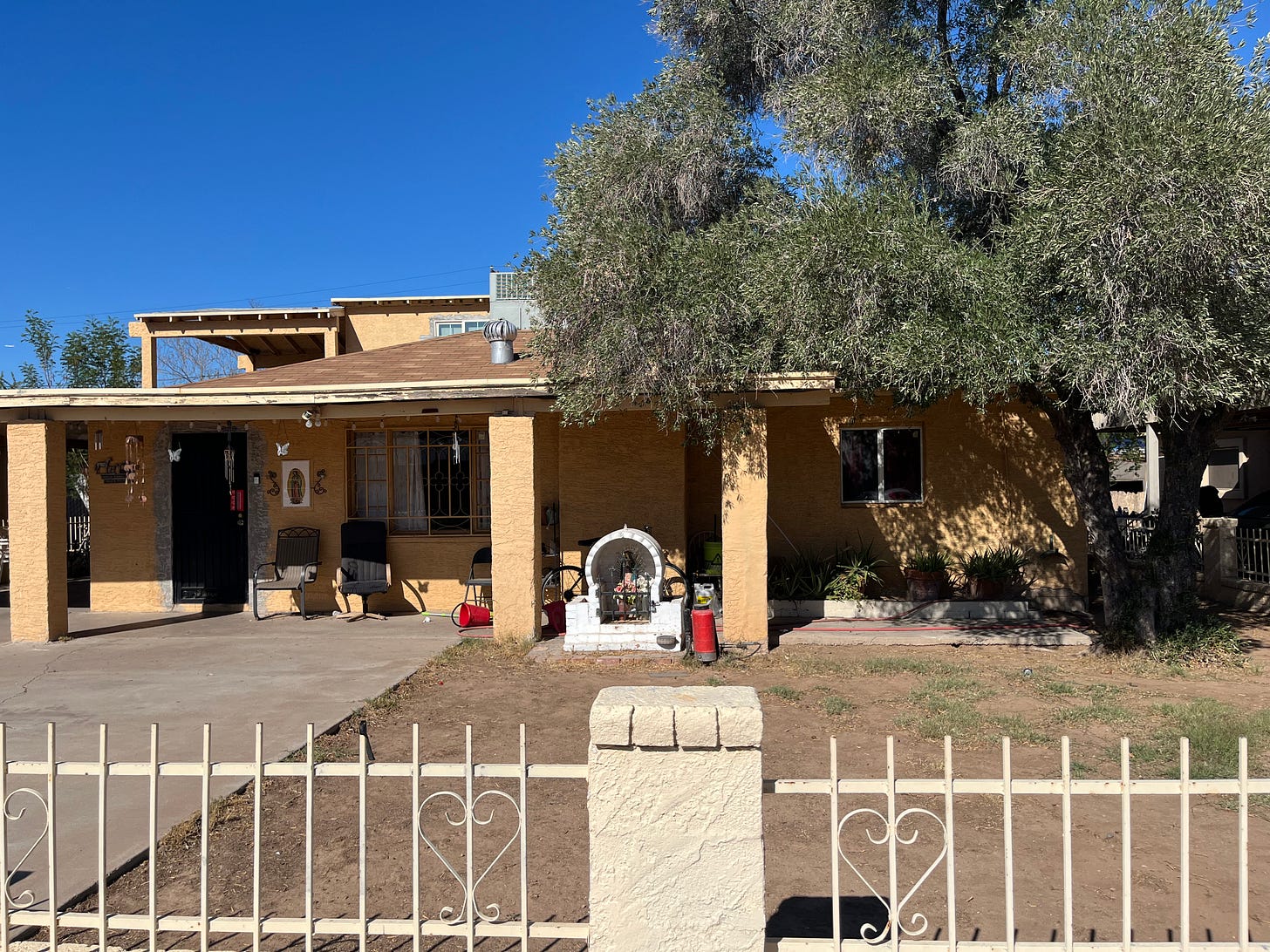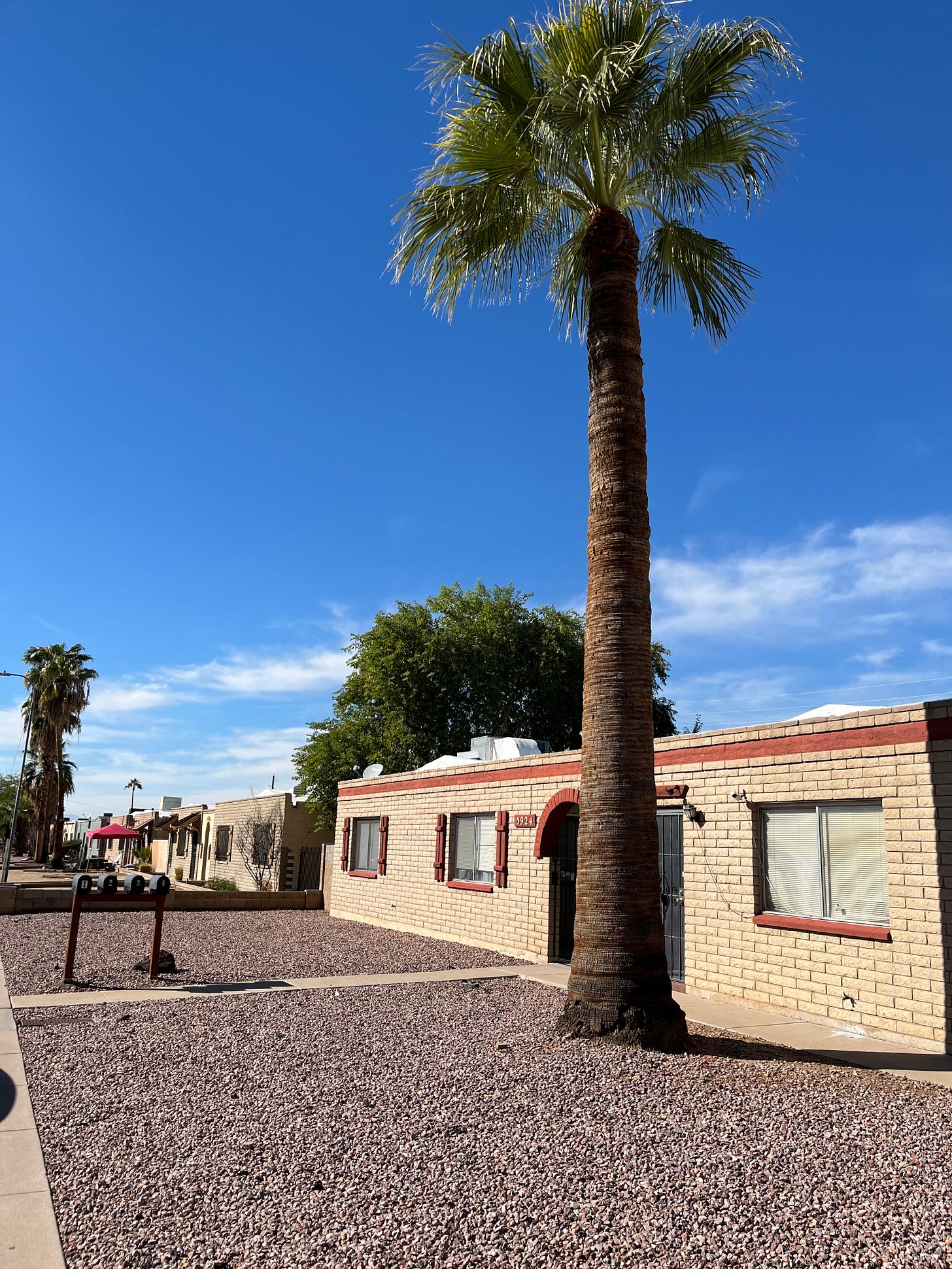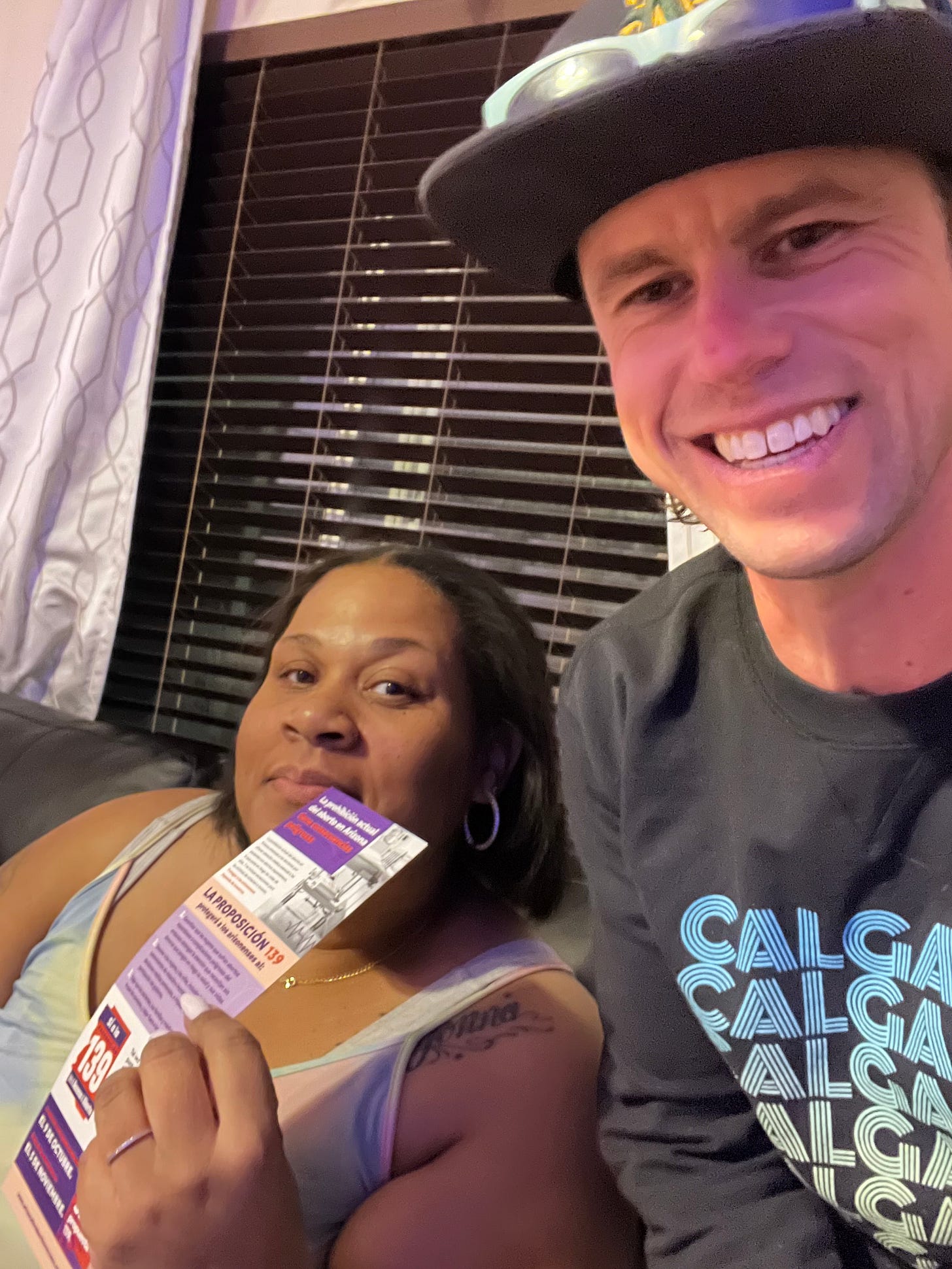Don, a bare-chested white man in his 60s with a handlebar mustache answered the door of his small shack in Glendale, Arizona, rubbing his eyes and looking addled. I’d had to walk down several narrow alleyways, past fraying fences that contained loud, lunging dogs. Heavy Metal music ricocheted around the living room. Did he know it was Election Day and was he supporting Kamala Harris for President? “Yup, today’s the big day, innit?”
The cold hard realities of door-knocking in working class swing state districts is something every coastal, well-educated Democrat should experience. It’s humbling. It reminds me what people say about Peace Corps, the impact is possibly as big on those “doing the helping” as those “being helped.” It’s also exciting. Democracy in action sometimes means convincing a shirtless man in a dilapidated shack in Glendale, Arizona to turn down the Heavy Metal, drink some coffee, and get to the polls.
I asked if there were any issues he was concerned about? “Paying my rent,” he said without skipping a beat.
My brain buffered as I thought how to spin Kamala as a rent-payment-helper. I rolled out a talking point: “Trump’s tariff plan is estimated to cost every American an extra $4,000 a year.” Don rubbed his eyes and adjusted his shorts.
I asked about health care, but Don was a retired union welder, his health care plan was good. Was there anything holding him back from voting for Harris?
“She’s a women,” Don said matter-of-factly. Electoral politics wrings out one’s righteousness; nothing focuses a pragmatic approach like a potential vote. “OK” I responded calmly, “So what are your concerns related to that?”
“Too weak,” said Don. Again, as though he were stating plain facts.
“Well you know she was a prosecutor?” I said.
“Oh I hate prosecutors,” said Don. “I did three and a half years in prison for sending weed in the mail. Thirty years ago. Still pisses me off, ‘cause now it’s everywhere.”
“Yeah, that’s terrible. I’m so sorry,” I said. Dang. Big misstep. I tried to regroup. “You know, she was not that kind of prosecutor. She was prosecuting child molesters and big banks who—”
“I hate any kind of prosecutor,” Don shot back. “Messed up my whole life. Before that things were good, I was just being a hippie.”
Don began folding up my info sheet into smaller and smaller squares. I’d uttered fatal words. I’d wandered into an emotional landmine, not suspecting Don’s physic terrain so loaded. The door was done. I thanked him and walked on.
It wasn’t often while canvassing in Maricopa County, Arizona that I met a truly undecided voter, so this one stung. I was one of thousands who’d flown in from California to try to swing the crucial state for Kamala Harris and Democratic Senate Candidate Ruben Gallego.
Maricopa County is the country’s fourth most-populous county and is bigger than Delaware, Rhode Island and Connecticut combined. It’s flat and dry and radiates out from Phoenix on a seemingly endless grid of low-slung homes. Some had beautiful, humble altars for different Catholic virgin saints. Others strewn with tools, empty cans of beers, weed delivery bags.
It can be agonizing, especially when you can hear people watching TV and scuttling around inside, but they can’t be bothered to open the door again. Many of their door knobs were already saddle with mailers from other GOTV operations, so it’s understandable they didn’t want to be bothered by another bright-eyed Californian in a Patagonia jacket.
So when you actually get a live person, it’s the holy grail. In a mostly Latino and middle-class neighborhood of winding streets and uniformly designed homes, the app used for canvassing told me there was a 24 year old female named Yesenia who had voted in one out of the last three major elections (so likely not in 2018 or 2022 but in the 2020 Presidential). A wide-eyed girl of about three answered the door, followed by Yesenia, with hair pulled back, a sweet smile, and striking black eyeliner. She hadn’t voted and was undecided.
“I don’t like how Trump talks about Hispanics,” Yesenia said. “But I don’t think we should have so many people coming in. It doesn’t feel safe. But maybe not do it so harsh.”
I heard this multiple times among Latino voters. For many middle-class and second and third generation Hispanic-Americans, they have compassion, but it only extends so far. They have felt an influx of new migrants in their neighborhoods, and don’t like it.
So I said, “Kamala wants to control the border, but do it in a humane way.” Yesenia nodded. “Yeah, that would be good.”
Thinking Yesenia was a mother of the three year old girl, I pivoted to the child tax credit. “Oh she’s just my niece,” Yesenia said. I apologized. “Oh you’re good, you’re good,” she said. Dumb assumption, but not disqualifying.
Abortion is tricky to bring up without knowing someone’s religious fervor, so I said, “also, Kamala is trying to expand health care access.” And then I ventured out: “I don’t know how you feel about women’s freedoms and rights…”
“Yeah, I don’t think that’s anyone’s business,” she said. “That’s for a woman to decide.”
I detailed Trump’s role in overturning Roe vs. Wade, and soon she was nodding and saying, “yeah, I think I’m more Harris.” From there it was a reminder of the closest Voting Center, the need to bring ID, a huge thank you, a walk halfway down the block, and a silent fist pump.
Perhaps in retrospect the election result was simple: Republicans have been crushing Democrats in new voter registrations the last three years. Incumbents in Western Democracies that experienced post-pandemic inflation have been getting slammed in elections around the world. Biden was a very unpopular President by 2024, despite infrastructure and green jobs legislation he passed that will positively impact millions of people for years to come. And it’s hard to be the more inclusive party, being welcoming and humane to migrants, transgender folks, even supporting Ukraine. It’s the right thing to do, but it yields relatively few votes, and gets exploited ruthlessly by Republicans.
Rudy Jr. was sitting in his late model Toyota Camry with a LA Dodgers hat on. I congratulated him on the World Series victory. He chuckled. His parents names were on my list, but they weren’t around, so I asked if he’d voted, and could we count on him to support Harris? He raised his eyebrows.
“I’m military, so I don’t like how Biden was running things,” he said. “There’s a lot of people trying to come into this country the right way, even serving in the military, and then other people just slip in? I don’t like that. And we built all these Afghanistan people houses in New Mexico, and then after a few months, they disappeared. And some people say they just want an education, but I think some of them want to do harm to our country. I’m Mexican too, so I don’t like everything Trump says, but America first, you know?”
If it were a month before the election, I might have told him Afghani refugees had been highly vetted, and usually had family who had worked with American soldiers. I’d met and interviewed several of them, interpreters who’d taken fire in combat. But he was a Trump supporter, my remit was not to turn him around, and there was no way I was going to. I shared a bit about why I was supporting Kamala, thanked him for his time, and walked on.
It struck me how many people identified first as a “veteran” or a “nurse” or a “mother” before their ethnic or racial identity. After the Democrats flipped Georgia in 2020, it vindicated the “demographics is destiny” theory of an inevitably expanding Democratic electorate. This election was a rebuke to that. I met a lot of people for whom racial or female representation was not a primary motivating factor for voters. Costs and a sense of uncertainty and insecurity led the way.
It can be a lot to hear over and over that eggs and gas prices and interest rates seems more threatening than Trump. That bringing back to power a felon, a sexual predator, a bully who never accepted he lost the last election and worked tirelessly to overturn it is worth it cause “man, my bills were lower back then.” It’s hard to know what percentage is underlying misogyny, racism, Gaza outrage, or misinformation deep dives.
Peoples views are as unpredictable as ever. Dominique, a mild-mannered Black woman in her fifties smoking a cigarette on her patio said she voted for Harris but believed that “Biden’s a pedophile” and “he changed Easter into transgender awareness day.” When I told her it’s best not to believe everything you read online, a friend doing work on her apartment called out, “Yeah she’s a Tik Tokker!”
It is not a thankless exercise though. At the end of day, as the dark and cold crept in, I’m delivering another rambling message into a Ring doorbell recording device, pouring my heart out about why I came out from California, leaving my wife and two kids at home. And then I hear a voice answer back over the intercom. “Hey Dan, I’m just getting my nails done, but you can come in.” And then a door opens and a plump seven-year old Black girl with braids says hi, giggling. And I hear the voice again. “Dan, come on back.” A trio of young kids lead me down the hallway to the bedroom of Candace.
She’s on her couch, drying her freshly painted cream-white nails. A large fan buzzes from the ceiling. She’s already voted, but wants to get her son Drayshin to vote for the first time. They recently moved from Iowa, her son’s always busy working. I assure her he can get a new ballot at the Voting Center. “Oh really? Oh that’s great. See I knew you were good Dan ‘cause you kept on talking to the Ring, just really going for it,” says Candace. We both laugh.
It was that part of the night where my spiel had devolved into a tired, rambling prayer for dignity and kindness in our country, and Candace, the Ring voice of God, had answered my prayers.
Other times, one is struck by the unending series of small difficulties that prevent people from voting. Tiana, a single Mom with a lazy eye answered the door slowly in a tidy two-story apartment complex. “I want to vote,” she said. “But I can’t. Too many people. I have anxiety in crowds.”
I empathized, talked about how hard that must be. Mail balloting was over, since in Arizona it must arrive on election day, not just be postmarked. We had a car to give rides, but it was the actual polling place that was the problem. Could she take some medication and go do it quick, I asked? She laughed and shook her head. She doesn’t take medication. Again a stalemate, this time by technicality. She said she’d drive by on her way to pick up her son and see how busy it was. I told her how much I appreciated her effort.
My final door of the night of Election Day was a skinny 19 year old named Ebed. It was getting dark, the polls closed in less than an hour. When I started my pitch, he was immediately excited. “Bro, you don’t even know. I’ve been trying to figure out if I’m registered. I’m the only one in my family who can vote. Everyone in this house pays taxes, my parents, they don’t have citizenship. My sister, my brother, they got DACA. We all pay taxes but I’m the only one who can vote.”
He'd been searching on his phone to see if he was registered. I confirmed that if he was on my list he was registered, he just needed ID. The closest Voting Center was only a few blocks away at the school. “Oh, I’m gonna grab my coat and a beanie— I got my car right there.”
Don’t forget your ID, I reminded him. “Oh shoot, my ID Just fell out the other day, I’ve been trying to find it.” Yet another hurdle. We ran through his print ID options and he cobbled together his insurance and car registration. I thanked him, told him he’d made my night. And then he was off to cast the first vote of his family in this country after two decades of calling it home, against a man who was vowing to deport millions of people like his parents.









